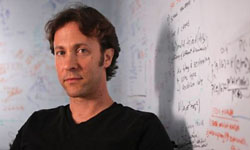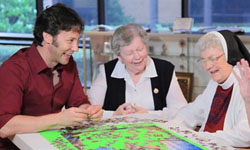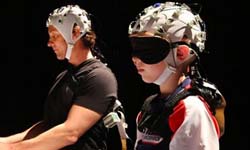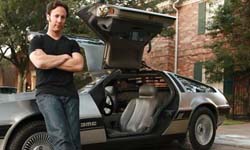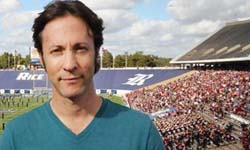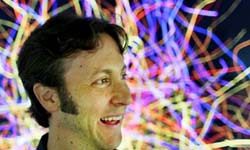-
The Brain with David Eagleman - 1. What is Reality
-
Dr David Eagleman
Series in which Dr David Eagleman takes viewers on an extraordinary journey that explores how the brain, locked in silence and darkness without direct access to the world, conjures up the rich and beautiful world we all take for granted.
- English subtitles
- 60
Series in which Dr David Eagleman takes viewers on an extraordinary journey that explores how the brain, locked in silence and darkness without direct access to the world, conjures up the rich and beautiful world we all take for granted.
-
The Brain with David Eagleman - 2. What Makes Me?
-
Dr David Eagleman
This episode explores the question of how the brain gives rise to our thoughts, emotions, memories and personality. We see how the process of becoming 'you' starts at birth. The brain of a newborn baby is not yet fully developed, instead it grows and shapes itself around life experience.
- English subtitles
- 60
This episode explores the question of how the brain gives rise to our thoughts, emotions, memories and personality. We see how the process of becoming 'you' starts at birth. The brain of a newborn baby is not yet fully developed, instead it grows and shapes itself around life experience.
-
The Brain with David Eagleman - 3. Who Is in Control?
-
Dr David Eagleman
This episode explores the great deception that greets us each morning when we wake up - it feels as though we are in conscious control of our lives, but in fact almost every action we take, every decision we make, every belief that we hold is driven by parts of the brain that we have no access to.
- English subtitles
- 60
This episode explores the great deception that greets us each morning when we wake up - it feels as though we are in conscious control of our lives, but in fact almost every action we take, every decision we make, every belief that we hold is driven by parts of the brain that we have no access to.
-
The Brain with David Eagleman - 4. How do I decide ?
-
Dr David Eagleman
The human brain is the most complex object we've discovered in the universe, and every day much of its neural circuitry is taken up with the tens of thousands of decisions we need to make. This episode takes a journey through the unseen world of decisions, and how they get made. We start with a simple one - choosing a flavour of frozen yoghurt - and learn that every decision we make is born of a 'winner takes all' competition between rival neural networks.
- English subtitles
- 60
The human brain is the most complex object we've discovered in the universe, and every day much of its neural circuitry is taken up with the tens of thousands of decisions we need to make. This episode takes a journey through the unseen world of decisions, and how they get made. We start with a simple one - choosing a flavour of frozen yoghurt - and learn that every decision we make is born of a 'winner takes all' competition between rival neural networks.
-
The Brain with David Eagleman - 5. Why do I need You ?
-
Dr David Eagleman
This episode explores how the human brain relies on other brains to thrive and survive. Dr Eagleman demonstrates how, from as young as ten months old, babies can discern who is trustworthy and who isn't.
- English subtitles
- 60
This episode explores how the human brain relies on other brains to thrive and survive. Dr Eagleman demonstrates how, from as young as ten months old, babies can discern who is trustworthy and who isn't.
-
The Brain with David Eagleman - 6. Who Will We Be?
-
Dr David Eagleman
In this episode Dr Eagleman journeys into the future, and asks what's next for the human brain and for our species. Mother nature has evolved a brain that is able to rewire itself according to its environment. We meet Cameron Mott, who had half her brain removed at the age of four, but was able to develop normally as her brain rewired itself to take over the functions of the missing half.
- English subtitles
- 60
In this episode Dr Eagleman journeys into the future, and asks what's next for the human brain and for our species. Mother nature has evolved a brain that is able to rewire itself according to its environment. We meet Cameron Mott, who had half her brain removed at the age of four, but was able to develop normally as her brain rewired itself to take over the functions of the missing half.

